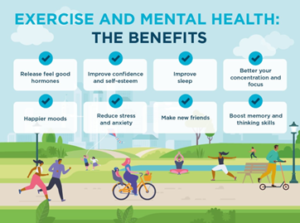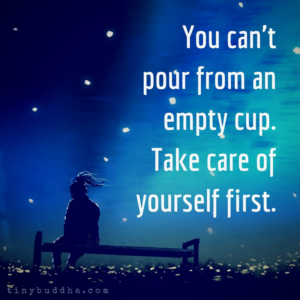Guest blog by Aaron Johnson, LCPC
When you think of exercise what is the first thing that comes to mind? Many feelings can make it challenging to get started. Sometimes you feel exhausted or overwhelmed, so you aren’t motivated to do anything physical. Other times you may feel hopeless or experience self-judgment because it can be very intimidating to go to a gym or fitness center. The good news is there are many options outside of joining a gym that can give you the benefits of physical activity. First, let’s look at how exercising for your mental health can have many positive outcomes.
Physical activity is known to promote sharper memory, higher self-esteem, better sleep, more energy, and stronger resilience. Exercise can also help you manage depression, anxiety, stress, and heal from trauma. Therefore, your physical activity can be a workout for mental health too. It can also be beneficial in building social relationships as it gives you the opportunity to meet new people at the gym or engage with others in your community as you go for a run or walk.
Exercise is often viewed as a way to build muscle, lose weight, or improve your physical appearance. It’s true that exercise can be useful for improving your physical health and even help you live longer. How? It can aid against heart disease, high blood pressure, and high cholesterol but that’s usually not the main thing that motivates many people to stay physically active.
Exercise and Depression
Research shows that exercise can be useful in treating mild to moderate depression. It works similarly to antidepressant medication and without the side effects. Physical activity promotes changes in the brain, including new brain activity patterns that can increase feelings of calmness and well-being. Exercise also releases endorphins, which energize your mood and make you feel good. Finally, exercise can serve as a distraction. It allows you to find some time for yourself and to break free from the cycle of negative thoughts that can feed depression. Clearly, exercise is important for mental health!
Related Reading: Can Depression and Anxiety Make You Sick?
Exercise and Anxiety
When people are anxious, they are experiencing a flood of thoughts that can look like overthinking or constant negative thoughts. With anxiety, exercise is more beneficial if you really focus on being present in the moment rather than zoning out or thinking about all your other responsibilities while you do it. This can result in more focus and less intrusive thoughts or other feelings of anxiousness. Try to pay attention to the feeling of your feet hitting the ground as you walk or run or the rhythm of your breathing. As you engage in mindfulness while exercising, you’ll be able to improve your physical conditioning as well as interrupt the cycle of worries and stress running through your mind.
What is Mindfulness?
According to mindful.org, “mindfulness is the basic human ability to be fully present, aware of where we are and what we’re doing, and not overly reactive or overwhelmed by what’s going on around us.” Exercising mindfully encourages you to pay attention to what happens in your body. It allow you to notice the connection between your mind, body, and breath. During mindfulness practice, you can live in the moment and experience the moment while deflecting any distracting thoughts. Exercising encourages more focus in the moment, as you need awareness of your body’s movements. This video offers some suggestions for exercise that involves mindfulness.
Exercise and PTSD (Post Traumatic Stress Disorder)
What do you notice about your body when you’re feeling stressed? You may feel some tension in your muscles or painful headaches. You may even experience some tightness in your chest, sweating, or a racing heartbeat. Physical activity is an effective way to break away from that unhealthy cycle as it can help relieve tension in your body and relax your muscles. According to a recent study “high-intensity resistance training improves sleep quality and anxiety in individuals who screen positive for posttraumatic stress disorder.” Exercise can be a great way to focus your stress and expel it outwardly through deep breaths and physical exertion.
https://www.priorygroup.com/blog/exercise-to-improve-mental-health
How to Get Started with Exercise
So back to our original question, how do you get started? Moving at home can be a great way to engage in physical activity whether it’s dancing around the living room, doing chores inside or outside your home, or even following a YouTube yoga video.
Take advantage of your time at work. If you have a break during the workday, try taking a walk around the office or outside for 10-15 minutes.
Being active with your family can also be a great way to increase your physical activity. Playing catch with your kids, getting on the ground to play with your pet, or even a family bike ride are great ways to increase your physical activity as well as build closer relationship bonds with your loved ones.
Physical activity and exercise are more than just creating fitness goals and getting in shape. It’s a way to develop a healthier lifestyle. Physical fitness affects mental health positively. Check out these other ways to make physical activity more fun and creative.
Life can be busy and missing a day of physical activity here and there doesn’t seem to make a difference in the short term. It’s hard to notice the accumulation of missing physical activity until one day it becomes obvious when you can’t do the thing you want to do.
While it’s never too late to begin an exercise routine, the longer you wait, the harder it is to even begin. Remember: you don’t have to do a lot. Start small – just move. Today, take a walk for 5 minutes. Taking time to walk and experience your environment through mindfulness can have great benefits for your mental health. Take time to breathe in fresh air, notice the sounds around you, notice the breeze and the sunlight on your skin. In no time, those 5 minutes will have passed – and probably more time because you were engaged with the environment.
Why to Exercise
Hopefully you can see that physical exercise has mental health benefits beyond physical benefits. Start small, start today, and begin enjoying those benefits.
“True enjoyment is from the activity of the mind and exercise of the body; the two are ever united.” -Wilhelm Von Humboldt
Therapists at Life Care Wellness often “prescribe” movement to help with depression, anxiety, and PTSD. Please reach out to us in our Glen Ellyn, Chicago (Jefferson Park), or Sycamore locations.
Aaron Johnson, LCPC
Aaron Johnson is a licensed therapist at Life Care Wellness seeing clients in the Jefferson Park neighborhood. He specializes in working with children, teens, and young adults who are navigating through difficult times and finding ways to overcome challenges. Aaron utilizes a client-centered, strengths-based approach, and Cognitive Behavioral Therapy (CBT).







